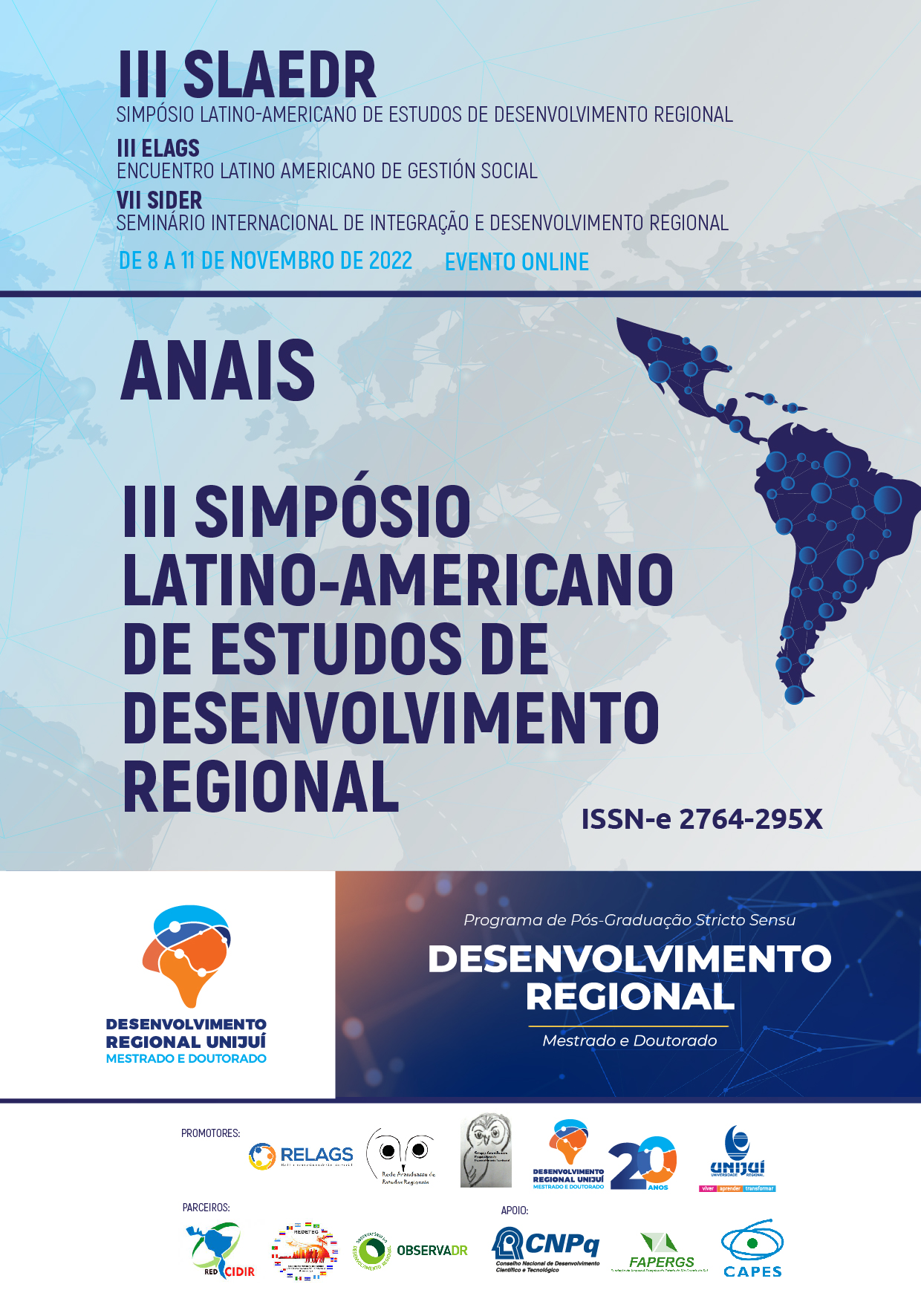DECISION MAKING FROM THE PERSPECTIVE OF TERRITORIALITY
Keywords:
Regional development, Territoriality, Decision makingAbstract
This theoretical essay aims to analyze the theoretical aspects that emerge about decision-making from the perspective of territoriality. To this end, the methodological approach followed a qualitative and exploratory approach, relying on authors such as Benko (1999), Etges (2005), Santos (2005), Flores (2006) and Etges and Degrandi (2013) who discuss regional development and territoriality, followed by main concepts and definitions on the subject and, finally, the conjuncture regarding decision-making was analyzed, with a view on the theories of Herbert Simon from authors such as Steingraber and Fernandez (2013) , Oliveira and de Paula (2014), Sbicca (2014), de Mello et al. (2021) and de Barros, Ruschel and Dalcin (2020). At the end of the work, the theoretical framework shows that the articulation of the theme of decision-making from the perspective of territoriality, with the intention of contributing to regional development, can contribute to the mobilization of social actors for the promotion and strengthening of horizontalities and reduction of entropy. In addition, the idea of limited rationality articulated in a territoriality perspective can represent an open door for the promotion of local cultures that privilege the common good, the preservation of the environment and the thought of guaranteeing adequate living conditions for future generations.
References
BENKO, G. A Ciência Regional. Oeiras: Celta Editora, 1999.
DE BARROS, T. F.; RUSCHEL, C. E.; DALCIN, D. As racionalidades e a tomada de decisão dos produtores de alfafa de Dezesseis de Novembro/RS. Anais do Simpósio LatinoAmericano de Estudos de Desenvolvimento Regional, v. 2, n. 1, 2020.
DE MELLO, L. L.; DA SILVA, L. C. A.; DA FONTOURA, F. B. B.; DEPONTI, C. M.; DA SILVA, M. Processo decisório na agricultura familiar: o caso da Coopasvale, Rio Grande do Sul, Brasil. COLÓQUIO-Revista do Desenvolvimento Regional, 18(2), 159-176, 2021.
ESAU, Carlos; DEPONTI, Cidonea Machado. Tomada de decisão pela diversificação: uma alternativa para agricultura familiar na microrregião de Santa Cruz do Sul/RS. DRdDesenvolvimento Regional em debate, v. 10, p. 439-460, 2020.
ETGES, Virginia Elisabeta. Desenvolvimento regional sustentável: o território como paradigma. Santa Cruz do Sul: Redes, 2005.
ETGES, Virginia Elisabeta; DEGRANDI, José Odim. Desenvolvimento regional: a diversidade regional como potencialidade. Revista Brasileira de Desenvolvimento Regional, v. 1, n. 1, p. 085-094, 2013.FLORES, Murilo. A identidade cultural do território como base de estratégias de desenvolvimento: Uma visão do estado da arte. Santiago, Chile: RIMISP, 2006. Disponível em: https://static.fecam.net.br/uploads/28/arquivos/4069_FLORES_M_Identidade_Territorial_como_Base_as_Estrategias_Desenvolvimento.pdf
HARVEY, David. A transformação político-econômica do capitalismo do final do século XX. In: HARVEY, David. A Condição Pós-Moderna. São Paulo: Edições Loyola, 1992.
OLIVEIRA, Kamila Pagel de; DE PAULA, Ana Paula Paes. Herbert Simon e os limites do critério de eficiência na nova administração pública. Cadernos Gestão Pública e Cidadania, v. 19, n. 64, 2014.
SANTOS, Milton. Por uma outra Globalização: do pensamento único à consciência universal. Rio de Janeiro: Record, 2003.
SANTOS, Milton. O retorno do território. Territorio y Movimientos Sociales. OSAL, v. 6, n. 16, p. 255-261, 2005.
SANTOS, Milton. A natureza do espaço: Técnica e tempo, razão e emoção. 4. ed. São Paulo: Editora da Universidade de São Paulo, 2006.
SBICCA, Adriana. Heurísticas no estudo das decisões econômicas: contribuições de Herbert Simon, Daniel Kahneman e Amos Tversky. Estudos Econômicos (São Paulo), v. 44, p. 579- 603, 2014.
STEINGRABER, Ronivaldo; FERNANDEZ, Ramon Garcia. A racionalidade limitada de Herbert Simon na Microeconomia. Revista da Sociedade Brasileira de Economia Política, 2013.



